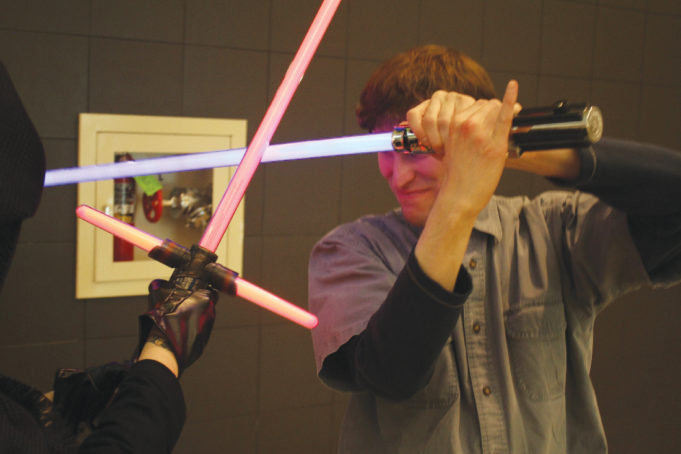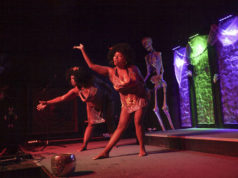A short time ago, in a ThinkGeek store not so far away, mostly young men and women joined together to celebrate something very important to them: Star Wars. They stormed into the gadget retailer in North East Mall dressed as Darth, Luke, Han, Princess Leia, and other characters from the 1977 film and its numerous prequels and sequels. If you’re asking why, you obviously don’t know R2D2 about Jedi.
Every May 4 is Star Wars Day. “May the Fourth be with you!” For most fans, it’s Halloween, Thanksgiving, and Christmas all rolled into one. For others, the way of the Jedi is even more.
It’s their faith.
Jediism, as defined by an online database, the Jedi Church, is a nontheistic religion whose members believe in a single all-powerful force that binds all things in the universe together. The faith received widespread attention back in 2001, when more than 390,000 residents of English-speaking countries put down “Jedi” as their religion on their national censuses. On a 2011 census in England and Wales, more than 176,632 identified themselves as followers of Jediism.
Before converting to Jediism, Arlingtonian Brenna West was raised Catholic. Her first experience with the Force came from George Lucas’ original trilogy.
“My dad sat me down in front of the TV when I was 4 or 5,” West remembered. “I watched those [movies] until the ribbons snapped.”
As she grew, so did the number of questions she asked her priests and nuns, questions they did not appreciate, she said.
“We were being introduced to the concept of confession,” West said. “I remembered thinking to myself, ‘If God is watching me all the time and knows what I’m thinking and feeling all the time, why do I have to tell a priest what I’ve done? Shouldn’t God already know?’”
When she was 15, she decided that the idea of religion was silly and unnecessary and did little to further one’s relationship with God.
“Religion was not created by a God,” West said. “It was created by us, which means it is inherently broken.”
For more than 10 years, West went about her life, moving from South Africa to New Zealand, not paying a second thought to religion. Then, in 2012, she stumbled upon the online forums of the Temple of the Jedi Order, one of the ministries of the Jedi. Forum members were talking about author Joseph Campbell and his 1949 novel The Hero with a Thousand Faces, in which he theorizes that all of the world’s stories are founded upon the same elementary ideas. It was on this forum where West eventually met her husband, Clint. She described the experience of visiting the forum as a homecoming for herself spiritually.
“That really struck me,” she said. “That was like, for the first time, seeing an undercurrent to everything.”
West decided to get involved within the Temple of the Jedi Order that same day. She got started in the initiates program, in which she was taught the Jedi ways by older members outside of the Temple’s online forums.
Starting her journey as a Jedi was tough at first, West said.
“Because it isn’t a linear path,” she said. “There have been days where I’ve said, ‘This is stupid. What am I doing?’ But it’s reflective of my own journey more than Jediism itself, because it’s not a linear path. You have ups, you have downs, you have days where you’re really fighting with your own progression because it’s not easy to actually sit down and examine who you are and discover everything about yourself. The good, the bad, whether you like it or not. It’s really hard work.”
To complete the initiates program, West had to go through eight lessons: Myth, The Self, Meditation, Connections, Temple Doctrine, World Religions, Personal Tools, and Jediism Essays. Each lesson comes with a set of tasks that must be completed before moving onto the next lesson.
To fulfill the Temple Structure, for example, West had to list what the non-clerical ranks are in the Temple, describe the offices and their responsibilities, and then explain where to find all of this information on the database. West had to do this for every lesson up until she became an initiate, at which point she was ready to become an apprentice under one of the Jedi masters.
The Temple of the Jedi Order is loosely structured, not unlike the other Jedi congregations out there. They don’t meet in person frequently, but they do gather online to view the week’s new sermon. West said the temple is considering expanding to a physical building, but she is against it. That plays to the idea of worship, she said, and Jediism is special, she feels, because it looks at faith conceptually, not literally.
The core belief of a Jedi, she said, is based on three tenets: focus, knowledge, and wisdom. The doctrine, she said, was created for Jedi to be able to serve one another and those around them. There is no light or dark side to the Force or Jediism, despite that being the primary conflict in the movies. As a Jedi, West doesn’t see people positively or negatively. She just sees them for who they are.
“We’re very aware of the fact that nobody is all good or all bad,” West reiterates. “We are a combination of experiences and feelings and views. We strive to examine our beliefs and actions and understand where they are coming from.”
Fully aware that Jediism is inspired by a fictional movie franchise, West admits her faith is criticized frequently by members of all sorts of religions.
“I remember coming across a Christian sign and a Muslim sign, actually, not too long ago, that denounced us by saying that we were a path to the devil, basically,” West said.
But she doesn’t hold grudges against non-Jedi for speaking out against her faith. Since they are not Jedi themselves, she knows they don’t fully understand where her and her fellow Jedi are coming from. Usually, she won’t even mention that she’s a Jedi until they ask her themselves.
“You can carry on a complete discussion about faith and spirituality without ever having to use the word, and they will completely resonate with and accept what you say,” she said. “It’s about the universal underlying principles, not the structure. People have no idea how much they have in common with the world around them.”
One commonality is the idea of a heroic quest.
“That is the beauty of what Joseph Campbell writes about,” she said. “He shows us that in every single story and in every single life there is the hero’s journey. There is that development of that hero from who they think they are, to discovering who they really are.”
Apply that to every religion, and West says you have coexistence. Christianity has Jesus Christ, Taoism the Dao, Buddhism the Buddha, and Jediism the Force. But whatever you call it or whatever you believe in, West feels it is that one thing that binds the human race together, whether we know it or not.
“A lot of people will talk about the Force in the same way as you might in hearing God’s voice,” she said. “The same way a Wiccan might feel the spirit of the world. The same way a spiritualist might feel energy. It’s all the same thing. I think that when we do let go of the layers of stuff and just shut up and listen, you feel it. You know it’s there. It guides you. You can call it intuition or inspiration, but there is something beyond us that is divine that you connect with.”
She thinks this is also why Jedi are most attracted to the concept of the Force.
“It doesn’t give it a face,” she said. “It doesn’t give it a structure or personality. It just tells you that it surrounds us, penetrates, and binds the galaxy together. If you took the concept of the Force and replaced it with the Dao, or with God, or any kind of deity that’s greater than us, you arrive at the same thing.”
Whether it’s Jediism or another religion, it’s never going to be a perfect system, West said. What’s better is to focus on what the system is pointing at, not at the system itself.
“It’s not about worship,” she said. “It’s not about saying, ‘The Force wants me to do this.’ It’s about knowing that we are connected and about knowing that everyone is a part of that. There is no ‘them’ and ‘us.’ It’s just us.”












